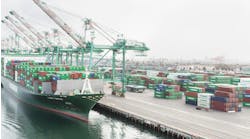Download this article in PDF format.
Rising transportation costs, freight capacity issues and driver shortages aren’t new problems for procurement professionals, but when you add a global pandemic to the equation, those issues exacerbate quickly. In analyzing the relationship between procurement and fleet management, the Institute for Supply Management (ISM) found that the cooperation between these two functions is growing for increasingly strategic reasons.
“While traditional reasons such as the need for department level cost-cutting help drive procurement and fleet collaboration, addressing the emergence and deployment of new technologies that improve fleet performance but can also drive complexity are generating more cause for collaboration,” ISM points out in its report. “The need to support aggressive, overarching enterprise goals also brings the two teams closer together throughout the fleet management lifecycle.”
Key survey findings include:
- Wanting to understand the current degree to which procurement is involved in fleet management, ISM found that over a third of procurement teams are not involved (34%), with about a fifth of that group, or 7% overall, planning to become involved.
- The overarching trend is toward tighter integration: two-thirds of organizations (66%) surveyed reported their procurement personnel is at least somewhat (30%), fairly highly (18%), or heavily involved (18%) in fleet management.
- In looking at how the procurement-fleet management connection has developed over the past five years, procurement’s degree of influence over fleet management has increased somewhat or substantially for over half of respondents where there was already involvement (53%).
- Procurement’s role is likely to be higher in tight-margin sectors like service businesses—delivery or residential support, for example, (landscape, plumbing, electrical). In higher-margin sectors like pharmaceutical sales, fleet management may have more autonomy.
- When looking at the degree of involvement reported by organizations of different size ranges (by employee count) in the survey, ISM says it’s more likely that larger organizations reported heavy involvement while smaller organizations reported less, relative to their representative population among survey takers.
“Size of the fleet is also a big determinant,” Dave Durepo, past president of the Automotive Fleet & Leasing Association (AFLA), said in the report. Fleet managers have to understand the pros and cons of makes and models; manage intricate leasing and maintenance considerations; make accident claims; and accurately calculate total cost of ownership. These aren’t skillsets that procurement typically has, “but the more these fleets grow and impact overall business performance, the more supply chain management practices can benefit the complexity,” Durepo added.
Benefits and Challenges
For procurement professionals that are involved in fleet management, ISM says efficiency improvements are the biggest benefit, followed by lower costs, more sharing of knowledge and information, and supply chain transparency.
For those not currently involved in fleet management, but who plan to be, efficiency improvements and lower costs are the two biggest reasons for considering closer collaboration. For procurement teams that aren’t involved in fleet management (and that don’t plan to be), ISM says the main reasons were conflicting priorities, speed of decision-making, different information technology systems and poor communication.
Two Sides of the Same Coin
According to ISM, 89% of fleet managers are either substantially or somewhat involved in procurement, while 63% of fleet leaders have an “organizational tie” to procurement. When asked how the two groups could best achieve success, Hayward sees honest, open dialogue as a best starting point. “The whole organization or division should set goals—like saving 10% company-wide in 2021,” he said, in an example of what that dialogue might look like, “and then procurement and fleet [can] work together to achieve it.”
Calling procurement and fleet operations “two sides of the same coin,” Wheels’ Jack Leffler said both sides must realize that they work for the same organization and that they have the same corporate goals. “Operations’ role is to educate procurement on the way fleet supports the business and adds value to the organization, while procurement’s role is to partner with operations and help to achieve the best possible deal with all vendors or services involved,” Leffler explained. “Only when both sides do their part can any organization achieve a best-in-class fleet program.”










